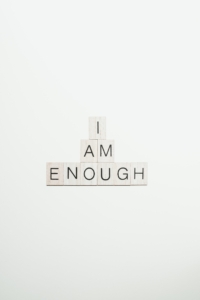How to Recognize Codependency and Narcissism in Your Friendships
Recognizing codependency and narcissism in your friendships may not seem relatable, but it’s worth reflecting on as you interact with friends of varying degrees. You will have a variety of friendships in your lifetime: co-workers, book club friends, workout buddies, lifelong friends, and casual friends who share a specific season of life. Knowing whether or not your friend is codependent and how that impacts narcissistic tendencies can help you and them.
What is narcissism?
The Diagnostic and Statistical Manual of Mental Disorders, 5th edition, says that narcissism can be adjacent to a mental health disorder known as Narcissistic Personality Disorder (NPD). However, narcissistic tendencies don’t necessarily qualify a person as having NPD.
 Unfortunately, both terms (narcissism and codependency) have undergone a platform mutation in recent years to their detriment because of social media, public overuse, and misunderstanding. Narcissism itself isn’t evil or all bad. It often stems from poor self-esteem and exemplifies someone who is hurting.
Unfortunately, both terms (narcissism and codependency) have undergone a platform mutation in recent years to their detriment because of social media, public overuse, and misunderstanding. Narcissism itself isn’t evil or all bad. It often stems from poor self-esteem and exemplifies someone who is hurting.
While NPD shows a pervasive pattern of at least five out of nine diagnostic traits and usually starts becoming more consistent in young adulthood, having some narcissistic traits does not necessarily mean you or a friend has NPD. If a person has true NPD, they meet at least five of the following nine criteria in all areas of their life, not just in one or two areas or environments.
- They think of themselves as more important than others.
- They imagine they’re deserving of or will automatically inherit certain rewards or achievements, even if there isn’t evidence to indicate such.
- They believe they are special or operate on a “different playing field” of sorts. More than seeing themselves as self-important (as in No. 1), this tendency is to see others through a lens of haughtiness.
- They need a high degree of validation from others. Think of the leader of the “mean girl” pack. She surrounds herself with “yes” girls who laud her because she needs the admiration.
- They have an unrealistic expectation about what others owe them or should give them. Another way to state this is a sense of entitlement.
- They have a tendency toward – and establish a pattern of this behavior – exploiting others for their own gain and/or manipulating others to get what they want or to get out of doing something they don’t want to do.
- They’re unwilling to listen to or try to empathize with someone else’s perspective or emotional needs.
- Envy is frequent, and it can be their envy of others or their misconception that others are envious of them.
- They struggle with arrogance in multiple arenas of life.
What is codependency?
 Unlike narcissism, codependency is not a disorder recognized by the DSM-5. It’s a behavioral pattern that was first used in the 1970s, made more universal in the 1980s when a book, Codependent No More by Melody Beattie was used to help those struggling with substance use disorder (SUD). Typically, a person with codependent behavioral patterns will often mask the consequences of another person’s behavior.
Unlike narcissism, codependency is not a disorder recognized by the DSM-5. It’s a behavioral pattern that was first used in the 1970s, made more universal in the 1980s when a book, Codependent No More by Melody Beattie was used to help those struggling with substance use disorder (SUD). Typically, a person with codependent behavioral patterns will often mask the consequences of another person’s behavior.
The person doing the masking may believe they’re protecting their loved one from negative consequences or hardship. What often happens, however, is an unhealthy attachment that requires a level of maintenance that can’t be sustained over time. It can create fractured relationships due to unclear boundaries.
Similar to narcissism, the term codependent has developed a negative reputation when, in fact, it’s simply a pattern of relating that can be unlearned when a person forms healthy attachments. Some markers of codependency include the following:
- Refusing to do things or go places unless the other person also wants to do them or go with you.
- Excusing a friend’s poor behavior (repeatedly) when it’s been hurtful to you.
- Feeling guilty when you take time out for yourself instead of serving your friend’s or loved one’s needs.
- Apologizing without working toward reconciliation, even if the fault isn’t yours, just to avoid conflict.
- Doing more than your share when your friend could also contribute. An example might be agreeing to go on a trip together, but you do all the planning, pay for the trip, and drive, while your friend simply adds a few recommendations.
- Feeling alone or like your friend doesn’t ask curious questions about your life often, yet you don’t mention it for fear of losing your friendship or not pleasing her.
How Codependency and Narcissism Arise from Similar Struggles
 On the surface, it appears that codependent people struggle with low self-esteem and, therefore, may not assert themselves or their own opinions. This is not an accurate portrayal of a codependent-tending person. Just as a narcissistic person does not always think of themselves as better than others or isn’t always toxic and full of drama. However, the two can share similar roots.
On the surface, it appears that codependent people struggle with low self-esteem and, therefore, may not assert themselves or their own opinions. This is not an accurate portrayal of a codependent-tending person. Just as a narcissistic person does not always think of themselves as better than others or isn’t always toxic and full of drama. However, the two can share similar roots.
When a person is codependent, they tend to learn those patterns of behavior from a parent or caregiver who did not give them the attention they needed as a child, or they were incapable of functioning as a healthy emotional adult. Either way, the person learned to cope by letting personal boundaries go by the wayside.
One example of this is when a person grows up and makes a friend at work. He had an alcoholic mother who often asked him to hide her receipts for wine from his dad so he wouldn’t know how much she was drinking.
As a young teen, he thought he was creating a more peaceful home life by saving the relational tension between his mom and dad. In reality, it was edging him toward an inability to develop healthy boundaries, recognizing it was not his job to save his mom from the consequences of her destructive behavior.
Then, in the friendship this adult man has with a co-worker, he isn’t able to see that the co-worker is taking advantage of their friendship by asking him to take the fall whenever he fails to prepare for a work presentation or wants to get by with leaving the office early. He asks his friend to cover for him by saying he had a doctor’s appointment, and this sets up a continual pattern of learned behavior and lack of boundaries.
Narcissistic personality tendencies can also be rooted in a struggle with boundaries. If as a young teen, someone struggles to see their worth and value, it’s usually referred to as low self-esteem. Rather than recognizing this and looking for healthy ways to develop confidence, a teenager may make fun of others to make herself feel better.
This kind of behavior – unchecked – can lead to dangerous adult relationships. She may use a grandiose view of herself to mask her low self-value and expect others to see her self-importance in the same light.
What to Do If You Recognize Codependency and Narcissism in Yourself or a Friend
 One of the downsides of the public using terms that are clinical in nature – such as toxic, narcissistic, or codependent – is that they can take on inaccurate meanings. A good way to respond if you think you or your friend exhibits some traits of codependency or narcissism is to be curious, gentle, and compassionate.
One of the downsides of the public using terms that are clinical in nature – such as toxic, narcissistic, or codependent – is that they can take on inaccurate meanings. A good way to respond if you think you or your friend exhibits some traits of codependency or narcissism is to be curious, gentle, and compassionate.
While it doesn’t mean you have to let your friend override your personal boundaries, you can ask compassionate questions if she says something like, “I can’t go through the line without you. I’m too scared.”
An appropriate, boundary-setting response might be, “I’m enjoying my lunch while it’s hot, so I am going to stay here. But I wonder why it’s hard for you to go alone. Is there someone at the head of the line who makes you nervous?” This lets her know you care, but also holds a firm boundary about wanting to eat your lunch while it’s hot.
Other appropriate responses include recognizing when these qualities are present in yourself and avoiding self-blame or negative self-thoughts. Instead, you can reflect on an appropriate next step.
It might be looking for a counselor who can help you examine where your learned behaviors come from and what kind of solutions are available to help you overcome them. To find a compassionate, trauma-informed counselor, our offices are ready to help with your inquiries when you are comfortable reaching out.
Photos:
“Sitting on the Mountaintop”, Courtesy of Matheus Ferrero, Unsplash.com, CC0 License; “Talk to the Hand”, Courtesy of Obie Fernandez, Unsplash.com, CC0 License; “Polite Signs”, Courtesy of mark tulin, Unsplash.com, CC0 License; “Boundary Line”, Courtesy of Erin Larson, Unsplash.com, CC0 License

 Handling grief and loss Older couples have experienced more grief and loss of family and friends. This can have an impact on how they see their future. Counseling can help them realign their focus on staying together and enjoying life as older adults.
Handling grief and loss Older couples have experienced more grief and loss of family and friends. This can have an impact on how they see their future. Counseling can help them realign their focus on staying together and enjoying life as older adults. Be supportive
Be supportive Communication Problems
Communication Problems Sexual problems can strain the intimate relationship between husband and wife. Erectile dysfunction, low libido, vaginal dryness, Peyronie’s disease, hormonal issues, or sexual disinterest can leave both parties feeling neglected, insecure, and emotionally hurt. In some cases, this can lead to physical or emotional affairs.
Sexual problems can strain the intimate relationship between husband and wife. Erectile dysfunction, low libido, vaginal dryness, Peyronie’s disease, hormonal issues, or sexual disinterest can leave both parties feeling neglected, insecure, and emotionally hurt. In some cases, this can lead to physical or emotional affairs. Addiction
Addiction Premarital counseling strengthens a relationship as part of the marriage preparation. Instead of waiting for the relationship to become strained before seeking help, premarital counseling helps a couple prepare for any serious issues before they arise in marriage. Premarital counseling helps a couple map out their future together.
Premarital counseling strengthens a relationship as part of the marriage preparation. Instead of waiting for the relationship to become strained before seeking help, premarital counseling helps a couple prepare for any serious issues before they arise in marriage. Premarital counseling helps a couple map out their future together. Counseling provides the couple with a safe space to talk about difficult and sensitive topics, and some of these may stir painful thoughts and memories. For the couple to get the most out of it, it’s important to be truthful about their fears, doubts, goals, and expectations. It’s better to face these head-on, even though that might be hard in the short term. With the help of a licensed and trained counselor, the couple can work through this together.
Counseling provides the couple with a safe space to talk about difficult and sensitive topics, and some of these may stir painful thoughts and memories. For the couple to get the most out of it, it’s important to be truthful about their fears, doubts, goals, and expectations. It’s better to face these head-on, even though that might be hard in the short term. With the help of a licensed and trained counselor, the couple can work through this together. Time is an important aspect of our lives. Spouses might want alone time to pursue their hobbies, and also time for shared activities. To promote a healthy work-life balance, a couple may need to establish boundaries between work and life, for instance, by not checking work emails after 5 pm.
Time is an important aspect of our lives. Spouses might want alone time to pursue their hobbies, and also time for shared activities. To promote a healthy work-life balance, a couple may need to establish boundaries between work and life, for instance, by not checking work emails after 5 pm. The term ‘codependency’ is one that’s gained currency in the last decade or so. It describes a variety of unhealthy relationship behaviors that can be caused in several ways. However, at the heart of codependency is an underdeveloped or poor sense of self. If a person doesn’t develop a clear sense of who they are, their values, and their boundaries, they are more prone to developing codependent patterns of behavior in relationships with others.
The term ‘codependency’ is one that’s gained currency in the last decade or so. It describes a variety of unhealthy relationship behaviors that can be caused in several ways. However, at the heart of codependency is an underdeveloped or poor sense of self. If a person doesn’t develop a clear sense of who they are, their values, and their boundaries, they are more prone to developing codependent patterns of behavior in relationships with others. There isn’t a single and straightforward path toward codependency. A person develops a poor sense of self and has difficulty maintaining healthy boundaries with others for a variety of reasons. The process of developing a healthy sense of self was often disrupted by experiences such as childhood trauma or experiences such as abandonment, or neglect. These can be in the form of a parent dying, parental divorce, or being literally abandoned.
There isn’t a single and straightforward path toward codependency. A person develops a poor sense of self and has difficulty maintaining healthy boundaries with others for a variety of reasons. The process of developing a healthy sense of self was often disrupted by experiences such as childhood trauma or experiences such as abandonment, or neglect. These can be in the form of a parent dying, parental divorce, or being literally abandoned. Depending on your situation, societal or cultural expectations can also play a role in nurturing codependency. If, for instance, there’s more of an emphasis on the collective – society, your local community, or the family – over the individual, that may lead to codependent behaviors. While it’s important to look out for others and love them well, it can be detrimental to do so without regard to personal well-being.
Depending on your situation, societal or cultural expectations can also play a role in nurturing codependency. If, for instance, there’s more of an emphasis on the collective – society, your local community, or the family – over the individual, that may lead to codependent behaviors. While it’s important to look out for others and love them well, it can be detrimental to do so without regard to personal well-being. A friendship, even a good friendship, can be overcome by codependent dynamics. If a friend is in trouble and you bail them out, that’s one thing. However, if you begin to fall into that pattern of relating to each other, a codependent dynamic can develop. A healthy friendship can become codependent in several ways, or it might commence between two people with codependent tendencies and patterns of behavior. Recovery, however, is possible.
A friendship, even a good friendship, can be overcome by codependent dynamics. If a friend is in trouble and you bail them out, that’s one thing. However, if you begin to fall into that pattern of relating to each other, a codependent dynamic can develop. A healthy friendship can become codependent in several ways, or it might commence between two people with codependent tendencies and patterns of behavior. Recovery, however, is possible. Christian couples need Christ as the foundation
Christian couples need Christ as the foundation Although quality time with your spouse is crucial for maintaining an emotional connection, you must also preserve your individuality. Pursue your own hobbies and interests, and encourage your spouse to do the same. For some couples, this may look like one person playing video games while the other reads on a Saturday morning. For other couples, it could be taking turns going out with friends.
Although quality time with your spouse is crucial for maintaining an emotional connection, you must also preserve your individuality. Pursue your own hobbies and interests, and encourage your spouse to do the same. For some couples, this may look like one person playing video games while the other reads on a Saturday morning. For other couples, it could be taking turns going out with friends. Place your relationship above all others
Place your relationship above all others No one really likes doing chores, but maintaining a clean and healthy home is essential for overall well-being. Support your spouse by helping out with chores. Some couples split chores between them, while others gravitate toward chores that their parents may have done.
No one really likes doing chores, but maintaining a clean and healthy home is essential for overall well-being. Support your spouse by helping out with chores. Some couples split chores between them, while others gravitate toward chores that their parents may have done. The storyline of the Bible tells us that something went horribly wrong, and when humans decided that they could name and discern what is good for themselves, things went off the rails (Genesis 3). The problem with each of us deciding what is good in our own eyes means that there can be a conflict between different ideas of what is ‘good’. When people pursue what’s good for them, it might not always be what’s good for others, too.
The storyline of the Bible tells us that something went horribly wrong, and when humans decided that they could name and discern what is good for themselves, things went off the rails (Genesis 3). The problem with each of us deciding what is good in our own eyes means that there can be a conflict between different ideas of what is ‘good’. When people pursue what’s good for them, it might not always be what’s good for others, too. Feeling drained or exhausted Instead of invigorating you, your relationship and interactions with each other leave you feeling physically exhausted or emotionally drained. Similarly, if you’re consistently anxious or stressed when you think about the relationship or interact with your partner, you may be in a toxic relationship.
Feeling drained or exhausted Instead of invigorating you, your relationship and interactions with each other leave you feeling physically exhausted or emotionally drained. Similarly, if you’re consistently anxious or stressed when you think about the relationship or interact with your partner, you may be in a toxic relationship. Feeling isolated A form of toxic behavior includes controlling and manipulating one’s partner. These limits include limiting the other’s friendships, autonomy, personal growth, or movements. You may feel like you’re being isolated from loved ones or activities that you enjoy.
Feeling isolated A form of toxic behavior includes controlling and manipulating one’s partner. These limits include limiting the other’s friendships, autonomy, personal growth, or movements. You may feel like you’re being isolated from loved ones or activities that you enjoy. When a person feels trapped in a toxic relationship, it can lead to feelings of isolation from the Lord. Being embroiled in constant conflict, being verbally or physically abused, or having one’s potential stifled can overshadow your journey and relationship with the Lord.
When a person feels trapped in a toxic relationship, it can lead to feelings of isolation from the Lord. Being embroiled in constant conflict, being verbally or physically abused, or having one’s potential stifled can overshadow your journey and relationship with the Lord. However, it’s also true that our emotions serve a purpose, and that includes anger. It’s quite likely that you’ve experienced someone expressing their anger before, except that you probably missed it because it was a healthy expression of anger. A person can assert themselves and their feelings of anger in a calm and collected manner. These expressions of anger aren’t sensational, and they often go unnoticed.
However, it’s also true that our emotions serve a purpose, and that includes anger. It’s quite likely that you’ve experienced someone expressing their anger before, except that you probably missed it because it was a healthy expression of anger. A person can assert themselves and their feelings of anger in a calm and collected manner. These expressions of anger aren’t sensational, and they often go unnoticed. Legal problems In the same vein, being angry and expressing it by shouting, cursing, hitting, or acting out anger on people or their property leads to trouble. That trouble could be in the form of getting arrested for causing injury to others or property. If a person gets into legal trouble for things they did because of anger, that strongly points to anger problems.
Legal problems In the same vein, being angry and expressing it by shouting, cursing, hitting, or acting out anger on people or their property leads to trouble. That trouble could be in the form of getting arrested for causing injury to others or property. If a person gets into legal trouble for things they did because of anger, that strongly points to anger problems. Your loved one’s anger affects them, but that anger doesn’t stay contained; it also affects you, in subtle as well as other ways. To begin with, anger affects your loved one’s health and well-being. The strain that anger puts on the human body can be problematic if a person is chronically angry. Anger can increase stress levels, the risk of heart disease, and the risk of conditions like diabetes, etc.
Your loved one’s anger affects them, but that anger doesn’t stay contained; it also affects you, in subtle as well as other ways. To begin with, anger affects your loved one’s health and well-being. The strain that anger puts on the human body can be problematic if a person is chronically angry. Anger can increase stress levels, the risk of heart disease, and the risk of conditions like diabetes, etc. In the main, the role you can play in your loved one’s life is as a support. You can help them by gently and lovingly pointing out the problem to them. You can encourage them to talk about what’s going on and allow them to communicate their angry feelings. This should be done within limits; for instance, they can share how they feel, but that doesn’t mean they can shout at you and be abusive.
In the main, the role you can play in your loved one’s life is as a support. You can help them by gently and lovingly pointing out the problem to them. You can encourage them to talk about what’s going on and allow them to communicate their angry feelings. This should be done within limits; for instance, they can share how they feel, but that doesn’t mean they can shout at you and be abusive.